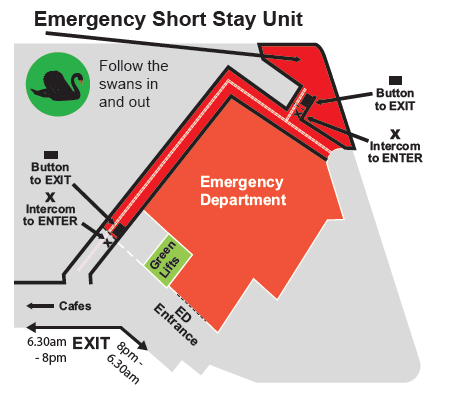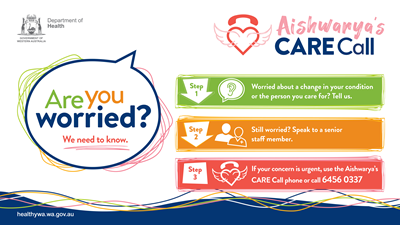Welcome to Emergency Short Stay
The Perth Children’s Hospital (PCH) Emergency Short Stay Unit or ESSU provides services for children requiring short-term assessment, management and /or observation for specific conditions or presentations.
How to enter/exit the Unit

Please make sure to wash or hand sanitise your hands each time you enter or exit the ward and your child's room.
- ESSU is a separate area located behind the Emergency Department.
- Access is via a walkway off the main hospital corridor, on the right past the Green lifts and Emergency Department entrance.
- To enter, press the intercom outside the door to this corridor. A staff member will open the door for you. Follow the corridor to the end, then turn right and then left to find the entrance door.
- Press the intercom outside this door and a staff member will open the door for you.
- To exit, go back through the same doors. Press the white EXIT button located on the wall. Turn right and follow the corridor to the end to the second door. Press the white button on the wall to open the door.
Food and retail
To find eateries and coffee shops, turn right onto the main hospital walkway at the end of the ESSU corridor and head towards the facilities on the Ground Level and Level 1 and 5 (via Pink Lifts). Find out more about what is available.
To find the vending machines, turn left onto the main hospital walkway then left again, towards the Green Lifts.
We are happy for you to bring your own food (nut free). You may also purchase food from the hospital and bring this back into ESSU to eat.
PCH Wi-Fi
Free Wi-Fi is available under HEALTH-Guest. Find out more about connecting.
Requesting assistance
For routine assistance, please use the nurse call bell on the handset or the call button in the bathroom.
For urgent assistance, please use the staff button located on the wall at the head of the bed or in the bathroom.
In the event of an emergency, please use the red call button located in the bedroom or bathroom.
Help us to keep your child safe
- Check that the personal details on their patient ID band are correct. Their ID band will be checked by our staff every time your child is given medication, transferred to another area inside the hospital and at the changeover of each shift.
- Sick and injured children are at risk of falling while they are in hospital. Keep their bed rails or cot sides up at all times (a nurse can show you how), supervise their play, help them to the toilet and in the shower when appropriate, keep the floor in their room tidy and provide non-slip footwear.
- While in hospital your child may be given medicine/treatment via a plastic tube directly into their hand or nasal gastric tube (feeding tube). If it starts hurting or becomes itchy or red and if any medications are making your child feel unwell, please tell a nurse or doctor.
- If you have any questions or concerns about the medications your child is receiving then speak to the doctor, nurse or pharmacist on the ward.
- Your child can risk developing a pressure injury if they sit or lie in one position for too long. If possible, please help your child change position in bed regularly to avoid them getting sore. If they have a plaster cast, splint, brace or other hard object on their skin and they complain of any pain, or if they have had a pressure injury before please tell a nurse or doctor.
Are you worried about your child in hospital?
We will listen to you. There are different ways to let us know you are worried. Aishwarya’s CARE Call steps will help you to progress your concerns.

Discharge
- When your child is ready to go home, the doctor or nurse will give you some information or a discharge summary containing details about your child’s condition and the required follow-up care (such as medications and appointments).
- Please ask us any questions you may have before you leave. We may also give you a letter for your local doctor.
Feedback
At PCH we are committed to working with patients, parents, carers and families to continually improve the quality of our care and services. Your feedback is important to us. You can leave feedback with us here.
You may also receive a text message in the days after your visit with a link to a survey. Please take the time to do the MySay Healthcare survey. It is a quick but important way to help us improve our services.